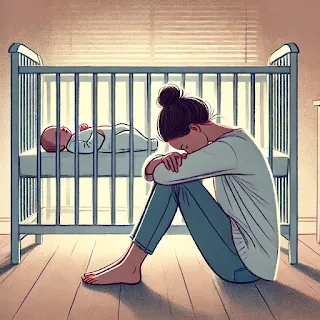Postpartum Depression: Symptoms, Causes, Treatment & Recovery
What is Postpartum Depression?
Postpartum depression (PPD) is a serious mental health condition that affects many new mothers after childbirth. Unlike the "baby blues," which typically resolve within two weeks, PPD can last for months and significantly impact a mother’s well-being. Understanding the symptoms, causes, and treatment options is crucial for early intervention and recovery.
Symptoms of Postpartum Depression
PPD symptoms vary from mild to severe and can develop within days or even months after delivery. Common symptoms include:
- Persistent sadness or low mood
- Excessive crying and emotional instability
- Fatigue or lack of energy
- Insomnia or excessive sleeping
- Loss of interest in activities once enjoyed
- Intense irritability or anger
- Feelings of guilt, shame, or inadequacy as a mother
- Difficulty bonding with the baby
- Thoughts of self-harm or harming the baby (in severe cases)
Causes & Risk Factors
The exact cause of PPD isn’t fully understood, but several factors contribute to its development:
Hormonal Changes
After childbirth, there is a rapid drop in estrogen and progesterone levels, which may trigger mood changes and emotional distress.
Emotional & Physical Stress
- Lack of sleep
- New responsibilities and overwhelming expectations
- Birth complications
- Unresolved trauma or previous mental health issues
Risk Factors
Some women are more susceptible to developing postpartum depression due to:
- A history of depression or anxiety
- Lack of social or emotional support
- Financial stress
- Complications during pregnancy or delivery
- Unplanned or high-risk pregnancy
How is Postpartum Depression Diagnosed?
If you suspect PPD, a healthcare provider can assess symptoms through:
- Psychological evaluation
- Depression screening tests (like the Edinburgh Postnatal Depression Scale)
- Discussion of personal and family medical history
Treatment for Postpartum Depression
1. Therapy & Counseling
- Cognitive Behavioral Therapy (CBT): Helps change negative thought patterns.
- Interpersonal Therapy (IPT): Improves communication and relationships.
2. Medication
- Antidepressants: Selective serotonin reuptake inhibitors (SSRIs) like sertraline are often prescribed.
- Hormone Therapy: Estrogen replacement may help regulate mood swings.
3. Lifestyle Changes & Natural Remedies
- Regular exercise (e.g., walking, yoga)
- Healthy, balanced diet rich in Omega-3s
- Meditation and relaxation techniques
- Seeking emotional support from family and friends
Postpartum Depression vs. Baby Blues
| Feature | Baby Blues | Postpartum Depression |
|---|---|---|
| Duration | 2 weeks or less | Can last for months |
| Severity | Mild mood swings | Persistent depression |
| Symptoms | Fatigue, anxiety | Severe sadness, guilt |
| Treatment Needed | Usually none | Therapy, medication |
Can Fathers Experience Postpartum Depression?
Yes! While less common, paternal postpartum depression (PPD) can affect new fathers due to hormonal shifts, stress, and sleep deprivation. Symptoms include:
- Increased irritability
- Emotional withdrawal
- Loss of interest in bonding with the baby
- Depression and fatigue
How Long Does Postpartum Depression Last?
The duration of PPD varies:
- Mild cases: May resolve within a few months with support.
- Moderate to severe cases: Can last over a year if left untreated.
When to Seek Professional Help?
If you or someone you know is experiencing:
- Persistent sadness for more than two weeks
- Thoughts of self-harm or harming the baby
- Difficulty performing daily activities
Seek medical assistance immediately! Postpartum depression is treatable, and seeking help is a sign of strength.
FAQs About Postpartum Depression
1. Can postpartum depression be prevented?
While it cannot always be prevented, steps like proper prenatal care, stress management, and having a strong support system can reduce the risk.
2. Is postpartum depression common?
Yes, it affects 1 in 7 women after childbirth.
3. Does breastfeeding help with postpartum depression?
Breastfeeding can promote bonding and hormone regulation, but some women may still experience PPD.
4. Can postpartum depression return in future pregnancies?
Yes, women who have experienced PPD are at a higher risk in subsequent pregnancies.
5. Can PPD go away on its own?
Mild cases may improve, but professional treatment ensures faster and more effective recovery.
Final Thoughts
Postpartum depression is a serious but treatable condition. If you or someone you know is struggling, don’t hesitate to seek professional support. A healthy mother means a healthy baby!


Comments
Post a Comment
Thanks for feedback!